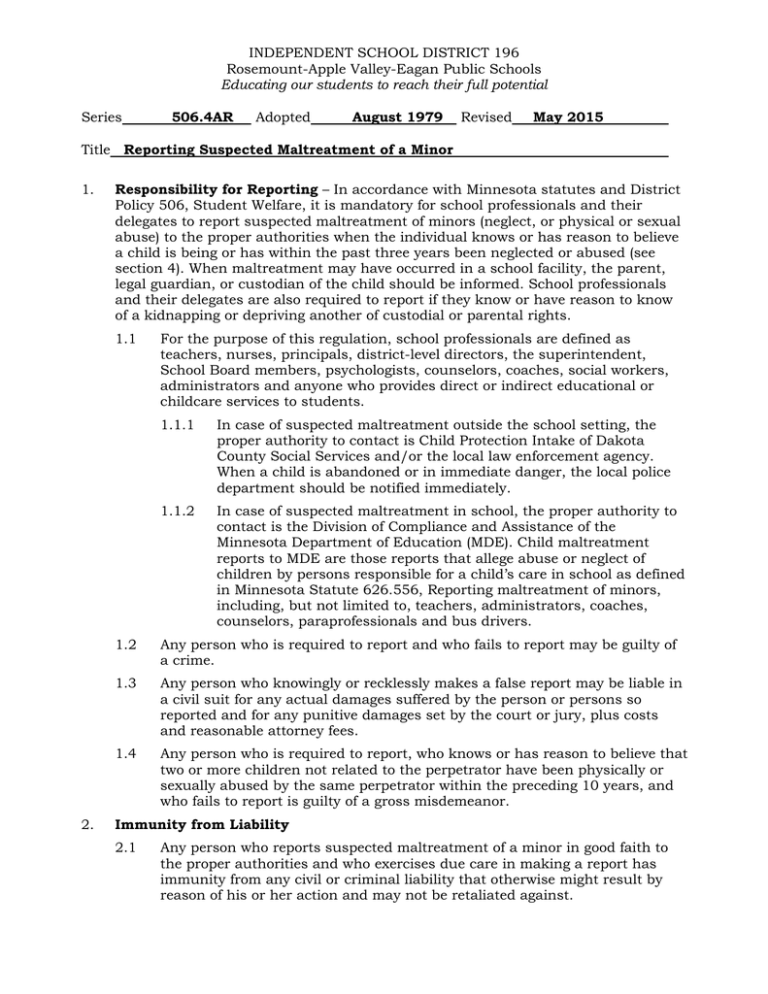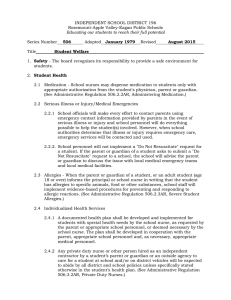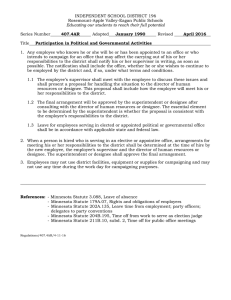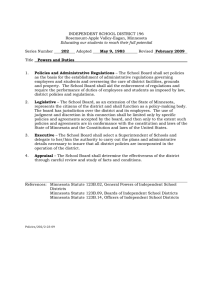
INDEPENDENT SCHOOL DISTRICT 196
Rosemount-Apple Valley-Eagan Public Schools
Educating our students to reach their full potential
Series
506.4AR
Adopted
August 1979
Revised
May 2015
Title Reporting Suspected Maltreatment of a Minor
1.
Responsibility for Reporting – In accordance with Minnesota statutes and District
Policy 506, Student Welfare, it is mandatory for school professionals and their
delegates to report suspected maltreatment of minors (neglect, or physical or sexual
abuse) to the proper authorities when the individual knows or has reason to believe
a child is being or has within the past three years been neglected or abused (see
section 4). When maltreatment may have occurred in a school facility, the parent,
legal guardian, or custodian of the child should be informed. School professionals
and their delegates are also required to report if they know or have reason to know
of a kidnapping or depriving another of custodial or parental rights.
1.1
2.
For the purpose of this regulation, school professionals are defined as
teachers, nurses, principals, district-level directors, the superintendent,
School Board members, psychologists, counselors, coaches, social workers,
administrators and anyone who provides direct or indirect educational or
childcare services to students.
1.1.1
In case of suspected maltreatment outside the school setting, the
proper authority to contact is Child Protection Intake of Dakota
County Social Services and/or the local law enforcement agency.
When a child is abandoned or in immediate danger, the local police
department should be notified immediately.
1.1.2
In case of suspected maltreatment in school, the proper authority to
contact is the Division of Compliance and Assistance of the
Minnesota Department of Education (MDE). Child maltreatment
reports to MDE are those reports that allege abuse or neglect of
children by persons responsible for a child’s care in school as defined
in Minnesota Statute 626.556, Reporting maltreatment of minors,
including, but not limited to, teachers, administrators, coaches,
counselors, paraprofessionals and bus drivers.
1.2
Any person who is required to report and who fails to report may be guilty of
a crime.
1.3
Any person who knowingly or recklessly makes a false report may be liable in
a civil suit for any actual damages suffered by the person or persons so
reported and for any punitive damages set by the court or jury, plus costs
and reasonable attorney fees.
1.4
Any person who is required to report, who knows or has reason to believe that
two or more children not related to the perpetrator have been physically or
sexually abused by the same perpetrator within the preceding 10 years, and
who fails to report is guilty of a gross misdemeanor.
Immunity from Liability
2.1
Any person who reports suspected maltreatment of a minor in good faith to
the proper authorities and who exercises due care in making a report has
immunity from any civil or criminal liability that otherwise might result by
reason of his or her action and may not be retaliated against.
Regulation 506.4AR
Page 2
2.2
3.
Any district professional who permits access by the local social services
agency, law enforcement agency or the Minnesota Department of Education
to the schools and who assists in good faith in an investigation (see section 5
below) has immunity from any civil or criminal liability that otherwise might
result by reason of his or her action.
Definitions
3.1
3.2
3.3
Sexual abuse means the subjection of a child, by a person responsible for the
child's care, a person who has a significant relationship to the child as
defined in state law or a person in a position of authority, to:
3.1.1
Any act which constitutes a violation of Minnesota Statutes 609.342
through 609.3451,Criminal sexual conduct in the first, second, third,
fourth or fifth degree;
3.1.2
Any act which involves a minor which constitutes a violation of
Minnesota Statutes 609.321 through 609.324, Prostitution offenses
or 617.246, Use of minors in sexual performance, or
3.1.3
Sexual abuse includes threatened sexual abuse.
Person responsible for a child’s care means:
3.2.1
An individual functioning within the family unit and having
responsibilities for the care of the child such as a parent, guardian or
other person having similar care responsibilities, or
3.2.2
An individual functioning outside the family unit and having
responsibilities for the care of the child such as a teacher, school
administrator or other lawful custodian of a child having either fulltime or short-term care, responsibilities including, but not limited to,
day care, babysitting (whether paid or unpaid), counseling, teaching
and coaching.
Neglect means:
3.3.1
The failure by a person responsible for a child's care to supply a child
with necessary food, clothing, shelter, health, medical or other care
required for the child’s physical or mental health when reasonably
able to do so;
3.3.2
Failure to protect a child from conditions or actions which
imminently and seriously endanger the child's physical or mental
health when reasonably able to do so;
3.3.3
Failure to provide for necessary supervision or child care
arrangements appropriate for a child after considering factors
such as the child’s age, mental ability, physical condition,
length of absence or environment, when the child is unable to
care for the child’s own basic needs or safety, or the basic
needs or safety of another child in their care;
3.3.4
Failure to ensure that a child is educated in accordance with state
law;
Regulation 506.4AR
Page 3
3.4
3.3.5
Prenatal exposure to a controlled substance, as defined in the law,
used by the mother for a nonmedical purpose, as evidenced by
withdrawal symptoms in the child at birth, results of a toxicology test
performed on the mother at delivery or the child at birth, or medical
effects or developmental delays during the child’s first year of life that
medically indicate prenatal exposure to a controlled substance;
3.3.6
Medical neglect, which includes but is not limited to the withholding
of medically indicated treatment from a disabled infant with a lifethreatening condition;
3.3.7
Chronic and severe use of alcohol or a controlled substance by a
parent or person responsible for the care of the child that adversely
affects the child’s basic needs and safety, or
3.3.8
Emotional harm from a pattern of behavior that contributes to
impaired emotional functioning of the child, which may be
demonstrated by a substantial and observable effect in the child’s
behavior, emotional response or cognition that is not within the
normal range for the child’s age and stage of development, with due
regard to the child’s culture.
3.3.9
Nothing in this section shall be construed to mean that a child is
neglected solely because the child's parent, guardian or other person
responsible for his or her care in good faith selects and depends
upon spiritual means or prayer for treatment or care of disease or
remedial care of the child in place of medical care; except that a
parent, guardian or caretaker, or a person mandated to report has a
duty to report if a lack of medical care may cause serious danger to
the child’s health.
Physical abuse means:
3.4.1
Any physical injury, mental injury or threatened injury inflicted by a
person responsible for the child's care on a child other than by
accidental means, any physical injury that cannot reasonably be
explained by the history of the injury, or any aversive and deprivation
procedures that have not been authorized under the law regarding
facilities for mental retardation and related condition.
3.4.2 Abuse does not include reasonable and moderate physical discipline of a
child administered by a parent or legal guardian which does not result
in injury. Actions which are not reasonable and moderate include, but
are not limited to, any of the following that are done in anger or without
regard to the safety to the child:
3.4.2.1
Throwing, kicking, burning, biting or cutting a child;
3.4.2.2
Striking a child with a closed fist;
3.4.2.3
Shaking a child under age three;
3.4.2.4
Striking or other actions that result in any non-accidental
injury to a child under 18 months of age;
3.4.2.5
Unreasonable interference with a child’s breathing;
3.4.2.6
Threatening a child with a weapon, as defined in state law;
Regulation 506.4AR
Page 4
4.
3.4.2.7
Striking a child under age one on the face or head;
3.4.2.8
Purposely giving a child poison, alcohol or dangerous,
harmful or controlled substances that were not prescribed
for the child by a practitioner, in order to control or punish
the child; or other substances that substantially affect the
child’s behavior, motor coordination or judgment, or that
results in sickness or internal injury, or subjects the child
to medical procedures that would be unnecessary if the
child were not exposed to the substances, or
3.4.2.9
Unreasonable physical confinement or restraint not
permitted by law, including but not limited to tying, caging
or chaining.
3.5
Mental injury means an injury to the psychological capacity or emotional
stability of a child as evidenced by an observable or substantial impairment
in the child’s ability to function within a normal range of performance and
behavior with due regard to the child’s culture.
3.6
Threatened injury means a statement, overt act, condition or status that
represents a substantial risk of physical or sexual abuse or mental injury.
Reporting Process – School personnel who know or have reason to believe a child is
being neglected or physically or sexually abused, or has been neglected or physically
or sexually abused in the preceding three years, or is the victim of kidnapping or
deprivation of custodial or parental rights should report the situation to the
principal of the school in which the child is enrolled and must call the proper
authorities within 24 hours and make a written report within 72 hours (see section
4.6). The building administrator should be notified and may assist with the
fulfillment of all reporting obligations.
4.1
In the case of suspected neglect or physical or sexual abuse outside of school,
the principal, school nurse and/or reporter may discuss the situation with
the child or youth and emphasize that the school is not interested in
accusing or punishing anyone, but rather is interested in helping ensure that
the maltreatment does not continue.
4.2
In the case of suspected abuse or neglect occurring outside of school, the
proper authority to contact is the Child Protection Intake of Dakota County
Social Services and/or the local law enforcement agency.
4.3
In the case of suspected abuse or neglect occurring within the school, the
proper authority to contact is the Division of Compliance and Assistance at
the Minnesota Department of Education. Regardless of whether a report is
made, as soon as practicable after a school receives information regarding an
incident that may constitute maltreatment of a child in a school facility, the
school shall inform the parent, legal guardian, or custodian of the child that
an incident has occurred that may constitute maltreatment of the child, when
the incident occurred and the nature of the conduct that may constitute
maltreatment.
4.4
In case of suspected kidnapping or depriving another of custodial or parental
rights, the proper authority to contact is the local police department or the
county sheriff.
Regulation 506.4AR
Page 5
5.
4.5
When a school employee knows or has reason to believe a child has died as a
result of neglect or physical or sexual abuse, the employee shall report that
information to the appropriate medical examiner or coroner instead of the
local welfare agency, police department or county sheriff.
4.6
The school employee reporting the suspected neglect or abuse must follow the
oral report with a written report. The report must be submitted to the proper
authorities on Procedure 506.4.1P, Suspected Child Maltreatment Reporting
Form – Dakota County or 506.4.2P, Maltreatment of Students Reporting
Form – MDE, no more than 72 hours (exclusive of weekends and holidays)
after the oral report. The school principal shall assist with the completion of
the written report.
Interview with Students by Agency Officials
5.1
Local Social Services and Law Enforcement Agencies – Each local social
services and law enforcement agency has specific statutory authority to
interview at school, without parental consent, the alleged victim and any
other minors who currently reside with or who have resided with the alleged
perpetrator.
5.1.1
When the local social services or law enforcement agency determines
that an interview should take place on school property, written
notification must be received by school officials before the interview.
5.1.1.1
Such notification shall include the name of the child to be
interviewed, the purpose of the interview, and a reference
to the statutory authority to conduct an interview on
school property.
5.1.1.2
If the interview is to be conducted by the local social
services agency, the notification shall be signed by the
Dakota County Social Services director or his or her
designee.
5.1.2
Except when the alleged offender is believed to be a school official or
employee, the time, place and manner of the interview on school
premises shall be within the discretion of the school administrator,
but any such conditions must be reasonable and the interview must
be conducted not more than 24 hours after receipt of the notification
unless another time is agreed to between district officials and the
local social services or law enforcement agency. The local welfare or
law enforcement agency shall have the exclusive authority to
determine who may attend the interview. Every effort shall be made to
reduce disruption of the child's educational program, other students
and school staff when an interview is conducted on school premises.
5.1.3
School officials may not disclose to the child's parent, legal custodian
or guardian the contents of the interview notification or any other
related information regarding the interview until notified in writing
by the local social services or law enforcement agency that the
investigation or assessment has been concluded.
Regulation 506.4AR
Page 6
5.2
5.3
5.4
Minnesota Department of Education – The Minnesota Department of
Education, or a local welfare agency to which MDE has designated the
authority to assess or investigate a report, has specific statutory authority to
interview any children who are or have been in the care of a facility under
investigation and their parents, guardians or legal custodians.
5.2.1
Prior to any interview, the commissioner of the agency shall notify
the parent, guardian or legal custodian of a child who will be
interviewed, as specified in state statute.
5.2.2
If reasonable efforts to reach the parent, guardian or legal custodian
of a child in an out-of-home placement have failed, the child may be
interviewed if there is reason to believe the interview is necessary to
protect the child or other children in the facility. Information must
then be provided by the agency to the parent, guardian or legal
custodian as soon as possible after the interview.
5.2.3
MDE will contact school administrators before visiting a school, and
will carry an identification card to show their affiliation with MDE.
Interviews with students during school hours by agency officials must follow
these guidelines:
5.3.1
Investigating officers must remain in the administration office;
5.3.2
The educational program of the student must not be disrupted by
calling him or her out of class or making him or her miss class,
unless such an interruption is unavoidable;
5.3.3
The interview must be conducted in a private room or area where
confidentiality can be maintained;
5.3.4
The local social services or law enforcement agency shall determine
the people who may attend the interview, and
5.3.5
District personnel should take no action in the investigative process.
Interviews with district employees may take place at the request of the
investigating agency.
5.4.1
A school employee is entitled to have his or her legal counsel present
when meeting with a MDE investigator. The legal counsel must
personally represent the employee. The school district’s attorney is
not permitted to attend an investigative interview on behalf of a
school employee.
5.4.2
The school district may in its sole discretion provide a personal
attorney for the employee, so long as that attorney does not also
represent the school district. The employee’s union may also provide
a personal legal counsel to represent the employee in the interview.
The union steward or similar union official does not have a right to
be present because the MDE investigators are not representing the
employer.
Regulation 506.4AR
Page 7
References: -Minnesota Statute 245.825, Adversive and Deprivation Procedures;
Licensed Facilities and Services
- Minnesota Statute 518B.01, Domestic Abuse Act
- Minnesota Statute 609.342 through 609.3451, Criminal sexual
conduct in the first, second, third, fourth or fifth degree
- Minnesota Statute 609.02, Criminal Code, Definitions
- Minnesota Statute 609.2242, Domestic assault
- Minnesota Statute 609.25, Kidnapping
- Minnesota Statute 609.26, Depriving another of custodial or parental
rights
- Minnesota Statute 609.321 through 609.324, Prostitution offenses
- Minnesota Statute 609.379, Permitted actions
- Minnesota Statute 617.246, Use of minors in sexual performance
prohibited
- Minnesota Statute 626.556, Reporting of maltreatment of minors
- “Further Information On Child Abuse Reporting Requirements,”
memo from Cindy Lavorato, Assistant Commissioner, and Thomas J.
Lombard, manager, Monitoring and Compliance, Department of
Children, Families and Learning, November 29, 1999
- "Changes to the Maltreatment of Minors Reporting Act, Minnesota
Statutes 626.556," memo from Barbara Johndahl, program
supervisor, Department of Children, Families and Learning,
November 29, 2000
- Changes to the Maltreatment of Minors Reporting Act and The
Minnesota Government Data Practices Act,” memo from Barbara
Jondahl, Program Supervisor, Maltreatment of Minors Program, and
Tammy L. Pust, Assistant Commissioner, Office of Public Affairs and
Policy Development, Minnesota Department of Children, Families &
Learning, September 5, 2002
Regulations/506.4AR/5-12-15







